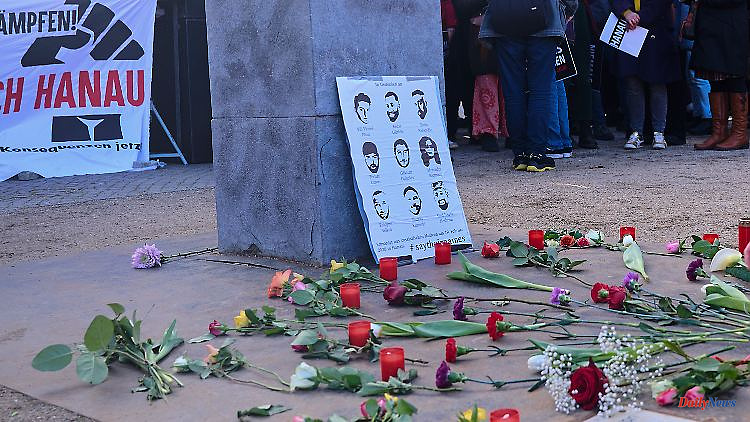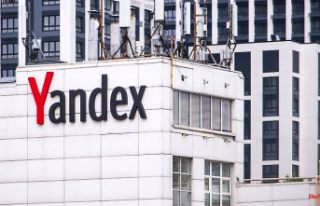Three years ago, nine people were murdered in a racist attack in Hanau. Federal Minister of the Interior Faeser and other politicians remember the victims and call for the fight against right-wing extremism. However, the families and friends of the victims still feel abandoned to this day.
In memory of the nine victims of the racist attack in Hanau, politicians and representatives of the victims' relatives have called for a fight against racism and right-wing extremism. There is still a lot that needs to be done here, said Federal Minister of the Interior Nancy Faeser at a memorial event in Hanau, Hesse. It is important to draw conclusions from this act "and not to rest". Relatives of the victims of the attack renewed their criticism of the lack of clarification of the crime three years ago.
The perpetrator tried to make the victims strangers, "but they weren't," said the minister, who is also the SPD's top candidate for the state elections in Hesse in October. Right-wing extremism poses the greatest threat to the basic democratic order. Regarding the criticism of the relatives, Faeser said that she knew how difficult this was, but that "there weren't always answers that one expected". The investigative committee of the Hessian state parliament is the place for clarification.
In Hanau, a 43-year-old German shot nine people with racist motives on February 19, 2020. He then killed his mother and himself. At the end of December 2021, the federal prosecutor's office stopped investigating the attack. There is no evidence of accomplices, instigators, assistants or accomplices of the assassin, it said.
"What's left is a non-healing wound," said Ajla Kurtovic, whose brother is one of the victims. She and the others affected were left behind with their questions - "and still do to this day". The relatives needed clear answers, not relativization. She will continue to fight for clarification and consequences.
Minister of State for Culture Claudia Roth spoke of a "shock for all of us" that is still having an effect today. The suffering of the victims and their grieving relatives must be given more attention in our remembrance, she demanded. Hanau is not an isolated case, but part of a chain of racially motivated excesses of violence in reunified Germany. Wherever racism shows up, wherever people are discriminated against, the entire democratic coexistence is also endangered. "That's why we are all asked," said the Minister of State. It is about showing attitude and face in the fight against racism and right-wing extremism.
The mayor of Hanau, Claus Kaminsky, also spoke against hate, racism and hate speech in his speech. "All of this is directed against people who live among us, who belong to us, to our city and our neighborhood." Democracy must "finally show its defensive face" - concretely and tangibly. Fundamental rights are valuable, but sometimes also fragile and need to be protected. "That's why we say to all racists, all anti-democrats, yes to all those who want to poison our country with their slogans: We are more! And we are stronger than your hatred!"
Among the several hundred guests and participants at the event was Hesse's Prime Minister Boris Rhein, who, together with Faeser, had previously laid flower arrangements for the murdered in the main cemetery. "There is no forgetting. What happened in Hanau three years ago today is still unbelievable," he explained. The fight against racism and right-wing extremism is the responsibility of the state. Confidence in the state must be restored among those affected. "I apologize that the state was not able to protect the victims," said Rhein. The results of the committee of inquiry and the measures to be derived from them are important. "We must do everything in our power to ensure that such a terrible act does not happen again."
The Federal Anti-Discrimination Commissioner, Ferda Ataman, meanwhile criticized the treatment of those affected by racism in Germany. Relatives of victims in Hanau and many others have just experienced that discrimination is played down "and dismissed as an irrelevant interest of minorities," she told the newspapers of the Funke media group on Saturday. "At the same time, we are observing that after the events on New Year's Eve, general suspicion was expressed against people with a migration background."
Three Roma were among the people with a migration background killed on February 19, 2020. The Federal Government Commissioner against antiziganism and for the life of the Sinti and Roma in Germany, Mehmet Daimaguler, declared that the "contempt for the minority, especially its criminalization" did not stop with the murders. Racism against Sinti and Roma is not limited to Nazis, but can be found "everywhere in Germany, including in the authorities".
"If we really fight the racist hatred of the right-wing extremists in Germany, we must not forget the racism in the middle of society," demanded Daimaguler. This also includes racial profiling by state structures.
At the memorial event, the discussion about the planned memorial for the victims in Hanau flared up again. Surviving relatives accused the city of opposing a location on the market square in the center of Hanau. A design had been selected for the memorial, but the location had not yet been determined.
Kaminsky made it clear that the marketplace would not be selected for this. Here the urban society has a "feeling of disturbance" with an overwhelming majority. He considers a place at the planned Center for Democracy and Diversity to be more suitable, for which Faeser handed over a grant of 3.4 million euros on the sidelines of the commemoration event.












